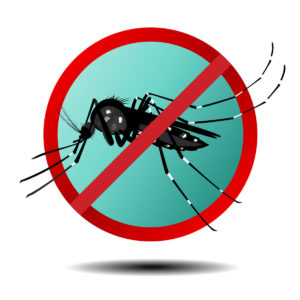Zika Virus and Animals
March 7, 2016 (published)
J.Scott Weese, DVM. DACVIM
I’ve been getting a lot of questions about Zika virus and animals. It’s great lo see that people are thinking more broadly about infectious diseases (but it isn’t doing much for my productivity this week).
To recap, Zika virus is a mosquito-borne virus related lo West Nile virus and dengue virus. Most people that are infected don’t get sick at all, and when they do, they usually get only mild signs of illness that resolve on their own. In the past few years, Zika virus has emerged in the Americas, particularly Brazil. Very recently, a link (still unproven) between infection of pregnant women and birth defects (babies born with small heads and brains [microcephaly]) has been reported, predominantly in Brazil.
Anti mosquito sign ,flat icon, vector
Can animals get infected with Zika virus?
- It depends on what you include in “animals.” We could be technical and say that humans are animals.
- Beyond that. non-human primates are susceptible. Zika was first identified in 1947 when
yellow fever researchers working in the Zika forest in Uganda stumbled onto it. They had a macaque in a cage and it developed a febrile illness from something that was transmissible. The virus was described as Zika virus in 1952 and then found in people a couple of years later.
But can domestic animals gel infected with Zika virus?
- Again, we need to think about the question. Infected means they get exposed lo the virus and it replicates in the body. That may occur, but we don’t have any evidence of it at this point.
- The more relevant question is whether animals can get sick from Zika virus exposure, and there’s also no evidence of that to date.
- A third aspect is whether infected (but potentially healthy) animals could be a reservoir for the virus, being able to pass it on to mosquitoes. There’s no evidence of that. either.
 So, the clearest answer is probably “maybe.” When it was a flu-like illness confined to some regions in Africa, Zika wasn’t a high priority so research hasn’t been extensive. The risk to pets in areas where the virus is circulating (areas where there are Aedes egpyti and Aedes albopictus mosquitoes) is probably very low. It would be good to look into the risks associated with domestic animals, including their susceptibility to disease and potential roles as reservoirs, but the likelihood that there is a relevant issue with either of these is probably remote.
So, the clearest answer is probably “maybe.” When it was a flu-like illness confined to some regions in Africa, Zika wasn’t a high priority so research hasn’t been extensive. The risk to pets in areas where the virus is circulating (areas where there are Aedes egpyti and Aedes albopictus mosquitoes) is probably very low. It would be good to look into the risks associated with domestic animals, including their susceptibility to disease and potential roles as reservoirs, but the likelihood that there is a relevant issue with either of these is probably remote.

